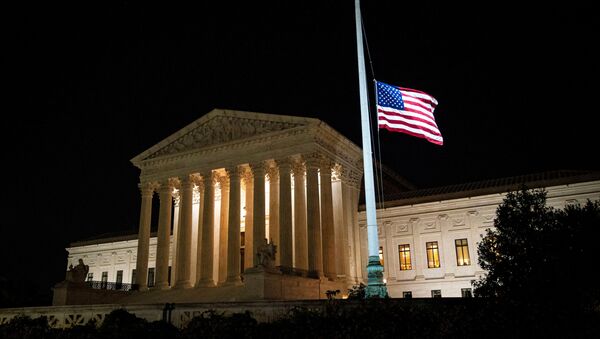A US Supreme Court justice seat became vacant on late Friday after it was announced that Ruth Bader Ginsburg passed away at the age of 87 "due to complications of metastatic pancreas cancer".
Trump said that he was saddened by the death of Ginsburg, adding that "she was an amazing woman", while the ABC News media outlet reported that he is expected to announce a nominee in the upcoming days. Democratic presidential candidate Joe Biden said that the new Supreme Court justice should only be announced after the 3 November election.
Ginsburg herself said that she wished her seat to remain vacant until the next president of the United States is elected, the NPR broadcaster reported.
Though the official list of nominees, published by the White House last week, includes more than 20 names suggested by Trump, here are the possible nominees that have drawn the most attention.
Possible Nomination Is 'Humbling Honour' for Ted Cruz
Senator Ted Cruz for Texas has appreciated the consideration, adding that it was a great honour to "support and defend the Constitution of the United States".
"It's humbling and an immense honor to be considered for the Supreme Court.The High Court plays a unique role in defending our Constitution, and there is no greater responsibility in public service than to support and defend the Constitution of the United States."
However, Cruz told Fox News on Sunday that the position is "not the desire of his heart", adding that he is more passionate about the "political fight" within the US Senate. "I want to be fighting to nominate and confirm three, four, five principled constitutionalist justices, but that's not where I want to serve. I want to stay fighting right where I am in the US Senate", he said.
In 2016, Cruz ran for the presidency, but suspended his campaign after losing the Indiana primary. He endorsed Donald Trump for the presidency in late 2016, though prior to that, they had both engaged in spats against each other, with Cruz calling the future president a "pathological liar" and "narcissist".
Tom Cotton Sees Nomination as Opportunity to Reverse Roe v. Wade
On learning that he's on the list, Arkansas Republican Senator Tom Cotton posted on Twitter with a reference to Roe v. Wade, a 1973 decision that ruled that restrictive state regulation of abortion is unconstitutional.
It's time for Roe v. Wade to go.
— Tom Cotton (@TomCottonAR) September 9, 2020
He elaborated on the topic later, saying that the Supreme Court needs justices that understand the difference between "applying the law and making the law", especially when it comes to the issues of abortion, religious freedom, and rights provided in the Second Amendment.
Prior to becoming Senator for Arkansas in 2014, Tom Cotton served as a Member in the United States House of Representatives. He also has a military service record, earning the rank of Captain during campaigns in Iraq and Afghanistan.
Josh Hawley Says Has 'No Interest in High Court'
Senator Josh Hawley for Missouri said he was honoured by the president's confidence, but declined the potential nomination citing his professional duty to the residents of Missouri. He also said he is looking forward to voting on Trump's nominee.
I appreciate the President’s confidence in listing me as a potential Supreme Court nominee. But as I told the President, Missourians elected me to fight for them in the Senate, and I have no interest in the high court. I look forward to confirming constitutional conservatives
— Josh Hawley (@HawleyMO) September 9, 2020
Hawley previously served as Attorney General of the State of Missouri, was an Associate Professor at the University of Missouri School of Law, and an attorney with the Becket Fund for Religious Liberty.
Noel Francisco: Supporter of Trump's Immigration Policies
Former Solicitor General of the United States, Noel Francisco, announced his resignation in June. He spent three tumultuous years in the office representing the president before the Supreme Court, during which almost every issue or policy Trump was working on was challenged, mostly by Democratic lawmakers.
Francisco defended Trump's agenda on immigration, and managed to ensure the travel ban. He tried to raise the issue of illegal immigrants being included in the census, which is now again pursued by the Trump administration.
In total, he has argued 17 cases before the Supreme Court, mostly concerning the issues of religious liberty, free speech and the separation of powers.



